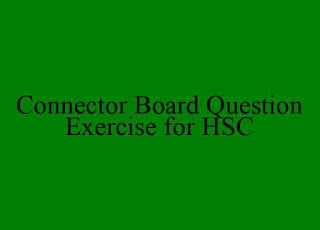Rules of Semantics
Semantic roles
Seeing words according to the meaningful role they play in language instead of seeing them as the container of meaning is called semantic roles. It is also called thematic roles, or thematic relation.
Agent:
1.Doer of an action.
2. Someone who initiates an act.
3. We usually have an agent as the grammatical subject of the sentence.
Example of Agent:
1. Boy plays football.
2. Michael opened the door of the car and got into it.
3. Cat is drinking milk.
4. John put the keys on the desk.
Theme / Patient:
1. Receiver of the action.
2. Undergoes the action, change, event expressed by the verb.
Example of Theme / Patient:
1. The girl kicked the ball.
2. The wind blew the ball away.
3. The cat caught the mouse.
4. A car ran over the ball.
5. A cat drank the milk.
Instrument and Agent experiencer:
1. Action performed through something is called instrument.
2. Experiences a perception, feeling or state.
Example of Instrument and Agent experiencer:
1. The man cut the cake with a knife.
2. She used a crayon to scribble a note.
3. That door was broken by the hammer.
You will understand the overall scenario so what to understand words are not only judged by the meaning. They convey this is what we are going to understand in this article. So what I usually see words as a container of meaning. They can be another form in the scenario.
We can see words according to the role. They play in the sentence so same things differently it would be very helpful in learning and a new language. So what is different same functional meaning of words is sort of a different approach.
We are going to learn the semantic rules another name for is thematic rules so semantic rules and thematic rules are synonymous terms.
So first of all the same words according to the meaningful rule, they play in language instead of seeing them as a container of me. So you're saying words according to the meaningful role. They play in language instead of just seeing them as a container of meaning. I mean the meaningful the rule they play in every sentence in length. So instead of saying grammar or rigidly seeing traditional grammar. We are going to learn the features of the grammar and these are the concepts on the advanced grammar. So you will love them. It is also called the thematic roles or thematic relation.
First of all, we have few terms here to understand for the understanding the semantics was in general. So we have an agent. we have theme/patient instrument and experiences. So these are the few basic terms and understand these semantic rules or semantics Relations or thematic relations. So the agent is the doer of action like in traditional grammar.
What are we going to learn?
What are semantic rules?
So first of all the same words according to the meaningful rule, they play in language instead of seeing them as a container of me. So you're saying words according to the meaningful role. They play in language instead of just seeing them as a container of meaning. I mean the meaningful the rule they play in every sentence in length. So instead of saying grammar or rigidly seeing traditional grammar. We are going to learn the features of the grammar and these are the concepts on the advanced grammar. So you will love them. It is also called the thematic roles or thematic relation.
First of all, we have few terms here to understand for the understanding the semantics was in general. So we have an agent. we have theme/patient instrument and experiences. So these are the few basic terms and understand these semantic rules or semantics Relations or thematic relations. So the agent is the doer of action like in traditional grammar.
We say subject but in semantic roles, we say doer or connection is called the agent. Someone who initiates an action more starts an action we usually have the agent as the grammatical subject of the sentence. They are in the form of the noun phrase. So the subject is like the functional. I like the structural approach but seeing the semantic role the place agent. So in structure, we call it a subject. But if we see its role then we cannot call it an agent. Because it's initiating an action or starting action of becoming the reason for an action. And the next one is a theme or patient receiver of the action in traditional grammar.
We call it to object but in advanced grammar, we call it theme or patient. Because their semantic role is to receive an action or undergoes the change event expressed by work. You will understand or worry you will understand by example. These are merely the basic keywords or the definition of these terms. So instrument and experiences we have the action performed through something is called instrument. So in traditional grammar, we don't have such type of things or experiencer. Experience is a perception of feeling or street. I mean not receiving any action but experiencing our perception feeling was there normally from human beings.
So examples of agent everything will be cleared with the example. Boy play is quick it here's an agent. He is initiating an act of playing cricket. John opened the door of the car and got into it. John is performing an action initiating an action. The cat was linking bear it so the cat was an agent. It would be human or non-human.
You put the keys on the desk next examples of theme patient. Receiver FC action who undergoes reaction. The boy kicks the ball. The ball is the patient. The boy play or non-human entity can also be the canal. The canal is also the agent or the ball is the theme or patient. Here the dog or the ball is experiencing. I mean receiving in action a car win over the ball or car doing the middle.
The overall in it this ball and milk. They're receiving the action performed by different agents avoid. The wind, the dog, cat, and cat. So it is very easy you can call it to object. The traditional grammar but in modern grammar and the semantic roles you will call them patient or theme. This is a new approach. So this is all just underline for your ears.
Examples of instrument and experiences. This is quite easy and not that much shaky as it is clear from its name that instrument any kind of instrument. We use for performance for acting for doing an action is called instrument and experiencer.
As experiencing a feeling perception or a state for example a cook cut the cake with a knife is the instrument. Here she used a crayon to sprayable a mood next is their window was broken by a hammer. Hammer is the instrument so that was all and for the experiencer.



